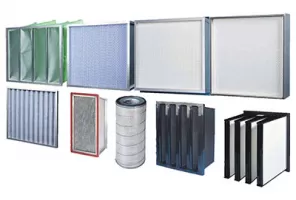 March 13, 2024
March 13, 2024
In the dynamic landscape of industrial processes, maintaining optimal air quality is paramount for both operational efficiency and employee health. Among the arsenal of tools designed to achieve this goal, High Efficiency Particulate Air(HEPA) filters stand out as stalwart guardians against airborne contaminants. However, in environments where elevated temperatures reign supreme, traditional HEPA filters may falter. Enter the high-temperature HEPA filter—a robust solution tailored to withstand the rigors of extreme heat while upholding stringent filtration standards.
Understanding High-Temperature HEPA Filters
High-temperature HEPA filters are engineered marvels crafted to thrive in environments where conventional counterparts struggle. Composed of specialized materials such as fiberglass or ceramic fibers, these filters boast thermal resilience, ensuring integrity even amidst soaring temperatures. Their intricate construction involves meticulous pleating, creating an expansive surface area for efficient particle capture without compromising airflow—a critical consideration in industrial settings where ventilation is essential.
Applications Across Industries
Metallurgy and Foundries: In the crucible of metalworking, where temperatures can soar to blistering heights, high-temperature HEPA filters emerge as indispensable allies. Whether in smelting operations or foundries, these filters diligently extract harmful particulates, safeguarding both product purity and worker well-being.
Glass Manufacturing: The glassmaking process demands precision and purity. High-temperature HEPA filters play a pivotal role in this realm, mitigating the risk of airborne contaminants compromising the optical clarity and structural integrity of glass products.
Pharmaceuticals and Biotechnology: Within sterile environments crucial to pharmaceutical and biotech industries, stringent air quality standards reign supreme. High-temperature HEPA filters, capable of withstanding autoclaving and other sterilization procedures, ensure that cleanrooms maintain pristine conditions essential for sensitive manufacturing processes and research endeavors.
Aerospace and Defense: In aerospace and defense applications, where precision and reliability are non-negotiable, high-temperature HEPA filters find their niche. From aircraft engine testing facilities to munitions manufacturing plants, these filters uphold stringent cleanliness requirements amidst the formidable heat generated by propulsion systems and pyrotechnic operations.
Advancements and Future Prospects
The realm of high-temperature HEPA filtration continues to evolve, spurred by advancements in materials science and manufacturing techniques. Innovations such as nano-coatings and composite materials promise enhanced thermal stability and filtration efficiency, opening new frontiers for applications in extreme environments.
Moreover, the growing emphasis on sustainability drives research into recyclable and eco-friendly filter materials, underscoring a commitment to environmental stewardship alongside technological progress.
Conclusion
In the intricate tapestry of industrial operations, high-temperature HEPA filters emerge as unsung heroes, steadfast sentinels against the invisible threats lurking in the air. Their versatile applications span a myriad of industries, from metallurgy to biotechnology, safeguarding both processes and personnel against the perils of airborne contaminants. As technology marches forward, these filters stand poised at the vanguard of innovation, embodying the relentless pursuit of cleaner, safer, and more efficient industrial environments.
 Mar. 20, 2024
Determining the Ideal Number of HVAC System Filters: A Comprehensive Guide
Mar. 20, 2024
Determining the Ideal Number of HVAC System Filters: A Comprehensive Guide
 Sep. 11, 2024
The Role of HEPA Filters in HVAC Systems: A Comprehensive Guide
Sep. 11, 2024
The Role of HEPA Filters in HVAC Systems: A Comprehensive Guide
 Mar. 18, 2024
Why Do I Need a HEPA Filter?
Mar. 18, 2024
Why Do I Need a HEPA Filter?